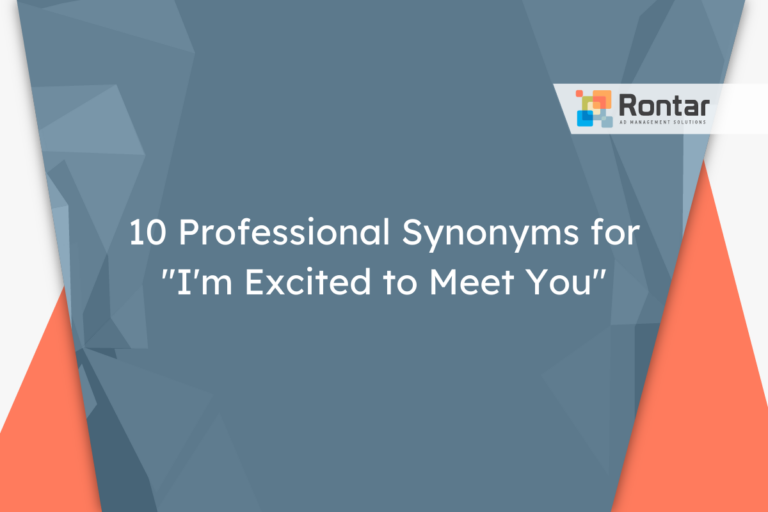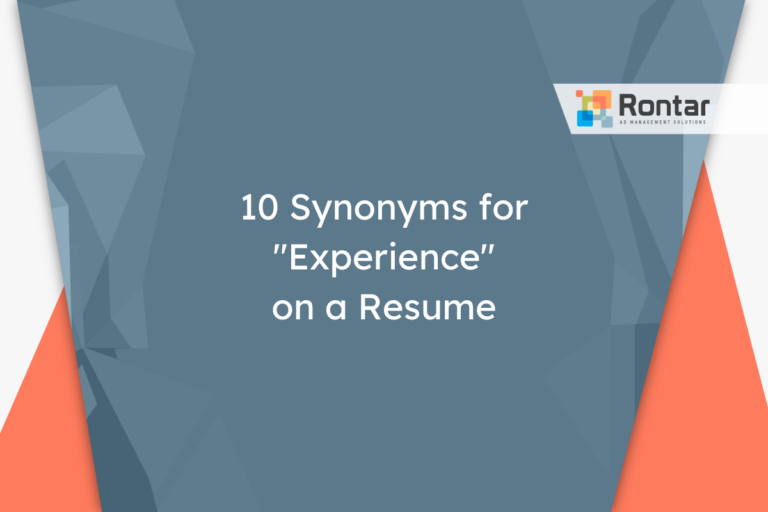10 Other Ways to Say “Excited for What’s to Come”

When we talk about the future at work, it’s important to express our feelings in a way that’s clear and appropriate. Saying “Excited for What’s to Come” is a common phrase, but sometimes we need different ways to express this sentiment.
This article lists 10 professional alternatives to convey excitement for the future. Each alternative is explained with examples to help you communicate effectively in various professional settings.
Is It Professional to Say “Excited for What’s to Come”?
The phrase “excited for what’s to come” can be considered professional, as well as formal or semi-formal, and polite. This expression communicates a positive anticipation for future events or developments and can successfully convey enthusiasm and a forward-looking attitude in a professional setting.
It is most effective when used with colleagues, business partners, or clients with whom you have established a positive rapport. It fits well in emails, business letters, and even in-person meetings or video calls.
Email example:
Dear Emily,
I wanted to update you on the progress of the project, as we've hit several key milestones ahead of schedule. I am excited for what's to come and confident in our team's ability to meet our goals.
Thank you for your continued support and guidance.
Warm regards,
Michael
Pros:
- Conveys positivity and anticipation without overstepping professional boundaries.
- Appropriate for a wide range of professional situations and recipients.
- It is versatile and can fit in both written and verbal communication.
Cons:
- May be viewed as somewhat generic if not supported by specific details or enthusiasm in the rest of the communication.
- Could be interpreted differently based on cultural or individual expectations of formality.
Someone might want to seek out an alternative phrase if they are looking for a way to express their feelings with more specificity or if they feel the phrase does not capture the full extent of their enthusiasm.
10 Other Ways to Say “Excited for What’s to Come”
Here are ten common alternatives that capture the essence of being excited for future possibilities, suitable for use in professional settings:
- Looking forward to the future
- Eager to see what lies ahead
- Anticipating great things
- Can’t wait to see what the future holds
- Optimistic about what’s next
- Thrilled about the upcoming opportunities
- Excited about our next steps
- Enthusiastic about future prospects
- Awaiting the next chapters with eagerness
- Pumped for what’s on the horizon
1. Looking forward to the future
This alternative maintains the original phrase’s positive and forward-looking spirit. It’s both professional and polite, making it versatile for various professional contexts. It implies a broader excitement beyond immediate events, suggesting a continuous journey or process.
This phrase is best used in formal communications, such as official reports or emails, where you want to keep a tone of optimism without being overly casual. It’s suitable for messaging colleagues, mentors, or even in communications to higher-level executives.
Example:
Hello Thomas,
I'm thrilled to be joining your team next week. Thank you for the warm welcome and all the helpful resources you've provided. I'm really looking forward to the future and working together.
Best,
Carla
2. Eager to see what lies ahead
This alternative conveys a sense of curiosity and readiness for future developments. It’s slightly less formal than “excited for what’s to come,” yet remains professional and polite. This expression is perfect for conveying personal interest and investment in upcoming projects or plans.
It fits well in communications with team members or project partners, especially when discussing new initiatives or phases in work. This phrase works well in emails or meeting discussions where the tone can be positive without being too casual.
Example:
Dear Team,
As we move into the next phase of our project, I am eager to see what lies ahead and how we can overcome challenges together.
Kind regards,
Elena
3. Anticipating great things
This phrase exudes confidence and a positive outlook towards future results or developments. It’s professional, yet imbued with a sense of enthusiasm and expectation. It’s more specific than some alternatives, implying not just excitement, but an expectation of success or positive outcomes.
Suitable for messages to stakeholders or team members, especially when leading projects with high stakes or in communications following a successful venture. This phrase is particularly impactful in motivational emails or speeches.
Example:
Dear All,
Thank you for your hard work this quarter. Anticipating great things in the next, thanks to your dedication and talent.
Sincerely,
James
4. Can’t wait to see what the future holds
This alternative offers a slightly more informal tone, though it can still be considered professional and polite enough for most workplace environments. It conveys a personal sense of excitement and anticipation. The phrase is particularly useful when you wish to express genuine enthusiasm and a strong personal stake in future outcomes.
Best suited for internal emails or communications with a team you’re closely involved with, especially when aiming to boost morale or express shared excitement about future possibilities.
Example:
Dear Colleagues,
As we complete this project, I can't wait to see what the future holds for our team.
Warm regards,
Liam
5. Optimistic about what’s next
This phrase is both professional and polite, carrying a sense of hope and positive expectation. It’s appropriate for use in more formal contexts due to its focus on optimism as a strategic stance towards the future. It implies not just excitement, but a confident, positive outlook.
This alternative is particularly well-suited for communications with higher management or external partners, where conveying a steady and assured anticipation is key. It’s great for emails or letters that outline future plans or strategies.
Example:
Dear Partners,
Reflecting on our past successes, I remain optimistic about what's next for us. Looking forward to continuing our journey together.
Best,
Nora
6. Thrilled about the upcoming opportunities
This option is similar in enthusiasm to “excited for what’s to come” but adds an element of specificity about being excited for opportunities, making it slightly less formal but still very much professional and polite. It’s perfect for conveying a readiness to tackle new projects or initiatives.
It’s especially fitting for use in communications with teams or in meetings where the focus is on rallying the group around new prospects. Suitable for emails, memos, or any platform where you’re highlighting future projects or opportunities.
Example:
Dear Team,
With our recent achievements, I am thrilled about the upcoming opportunities for our department. Together, we can reach new heights.
Cheers,
Carlos
7. Excited about our next steps
This phrase strikes a balance between personal enthusiasm and professional anticipation. It’s more specific, directly referencing “our next steps,” which makes it ideal for team settings where the focus is on collective action and future plans.
This expression fits well when addressing your team or department, especially in the context of launching a new phase of a project or after a planning session. It works well in emails, presentations, or during team meetings where the emphasis is on moving forward together.
Example:
Dear Team,
Following our planning session, I am excited about our next steps and confident in our success.
All the best,
Rebecca
8. Enthusiastic about future prospects
This variation is professional and encompasses a broad, forward-looking excitement. It is less personal and more formal, which makes it versatile for a variety of professional scenarios, from emails to external clients to internal strategy presentations. It suggests not just excitement, but a readiness and willingness to engage with what comes next.
It’s particularly effective in formal communications, such as proposals, reports, and emails to stakeholders, where a confident, positive tone is crucial.
Example:
Dear Stakeholders,
As we embark on the next fiscal year, I’m enthusiastic about future prospects and our shared success.
Regards,
Henry
9. Awaiting the next chapters with eagerness
This alternative emphasizes a narrative perspective, suggesting that the future is like the next chapters in a book. It’s professional, with a touch of creativity that makes it less formal but still polite and appropriate for workplace communications. It’s excellent for situations where you want to suggest progression or development over time.
This phrase works well in communications related to long-term projects, strategic planning, or creative endeavors. It’s suitable for use in emails, project updates, or communications that aim to inspire or motivate a team towards future goals.
Example:
Dear Creatives,
With our project moving forward, I am awaiting the next chapters with eagerness, knowing we’ll create something amazing.
Cheers,
Isabella
10. Pumped for what’s on the horizon
While “pumped” introduces a more informal tone, it remains sufficiently professional and polite for workplace environments where a casual or enthusiastic tone is welcomed. This phrase is great for conveying a high level of excitement and readiness for upcoming events or changes.
This phrase is especially suitable in less formal emails or team messages where a more casual tone can help to strengthen team spirit. It’s ideal for moments when you want to express genuine enthusiasm in a more relaxed manner.
Example:
Dear Team,
Looking at our road map, I’m pumped for what's on the horizon. Let's tackle these challenges head-on!
Best,
Lucas
Final Thoughts
Choosing the right way to express excitement about the future in a professional setting matters. The 10 alternatives provided give you a range of options tailored to different situations, from more formal to slightly informal, all while keeping a professional tone. Using these phrases can help make your communication more engaging and clear, reflecting your enthusiasm and positive outlook.






